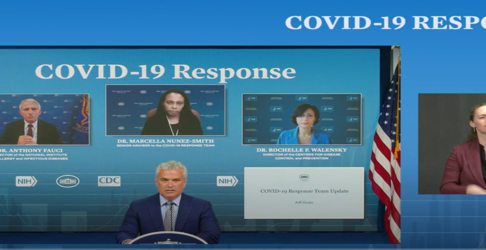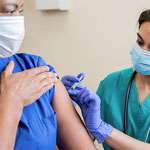By Marie Rosenthal, MS
Florida and Texas account for nearly 40% of new COVID-19 hospitalizations in the United States, as the delta variant continues to drive an increase in cases across the country, mostly among communities with low vaccination rates.

At more than 21,000 new cases per day, Florida is seeing more COVID-19 cases than the 30 states with the lowest case rates combined, according to Jeff Zients, the head of the U.S. COVID-19 Response Team.
However, that does not mean other states have any kind of bragging rights. According to the CDC, more than 90% of counties in the United States are experiencing substantial or high transmission of SARS-CoV-2.
The current seven-day average nationally is about 113,000 cases per day, according to Rochelle Walensky, MD, MPH, the CDC director, who spoke at the Aug. 12 briefing of the COVID-19 Response Team. “This represents an increase of nearly 24% from the prior seven-day average.
“The seven-day average of hospital admissions is at about 9,700 per day, an increase of about 31% from the prior seven-day period.
“And the seven-day average of daily deaths has also increased to 452 per day, an increase of 22% from the prior seven-day period,” she said.
To give that some perspective, the seven-day national average of new cases on June 27—about seven weeks ago—was 12,683; the seven-day average for hospitalizations was 1,845; and the seven-day average for deaths was 144, according to the CDC COVID-19 data tracker.
“We continue to see cases, hospitalizations and deaths increase across the country,” Dr. Walensky said. “As we have been saying, by far, those at highest risk remain people who have not yet been vaccinated.”
The country does seem to be overcoming some vaccine hesitancy. Since mid-June, Americans are “rolling up their sleeves” to be vaccinated, with about 500,000 people per day seeking a vaccine. Last week, 3.3 million people received their first vaccination.
“Importantly, we’re seeing the most significant vaccinations progress in states with the highest case rates. In fact, in the past month, we’ve nearly tripled the average number of shots each day in Arkansas, and quadrupled in Louisiana, Alabama and Mississippi. So we’re getting more shots in arms in the places that need them the most,” Mr. Zients said.
He pointed to strong initiatives from the public and private sectors for helping to boost vaccination rates. “Employers have the power to help end the pandemic,” he said.
All 5 million federal employees must be vaccinated or will have to get weekly COVID-19 testing and practice mitigation strategies. This week, the Department of Defense said COVID-19 vaccines will be required for more than 1.7 million active duty, reserve and national guard personnel.
The Department of Veterans Affairs and Department of Health and Human Services announced new requirements: All 350,000 VA health care personnel and all 25,000 HHS health care personnel must be vaccinated as a condition of employment.
“State and local governments, health care systems, businesses, small and large universities, and other institutions are also stepping up,” he said. “Since last week, Washington state, Washington, D.C. and Seattle have all adopted vaccination requirements. And more than 50 health systems across the country have announced that all staff need to be vaccinated, bringing the total to more than 200 health systems.
Many companies, including Amtrak, Capital One, McDonald’s and Walmart, announced new rules that workers must be vaccinated to return to the office.
Nearly 700 colleges and universities have announced vaccination requirements, and California announced all schoolteachers and staff in the state serving more than 6 million students will be required to be vaccinated or tested weekly.
The National Education Association and American Federation of Teachers, two of the largest unions in the country representing 5 million educators, child care workers and school staff, support these actions. They issued statements calling on school districts to draw up vaccination policies, including requirements for teachers and staff.
“So, clearly vaccination requirements are gaining momentum across the country and are already covering tens of millions of workers, educators, college and university students, and health care providers,” Mr. Zients said.
Boosters
The FDA is expected to expand the emergency use authorization for COVID-19 vaccines to allow booster doses for people who are moderately and severely immunocompromised, such as organ transplant patients.
“As we’ve been saying for weeks, emerging data show that certain people who are immune compromised, such as people who have had an organ transplant and some cancer patients who may not have had an adequate immune response to just two doses of the COVID vaccine,” Dr. Walensky said. “To be clear, this is a very small population. We estimate it to be less than 3% of adults.”
The Advisory Committee on Immunization Practices is expected to discuss the issue on Aug. 13, and make a recommendation.
“Emerging data, including from a significant study published in The New England Journal of Medicine yesterday, show that there is an enhanced antibody response after an additional dose of an mRNA [messenger RNA] COVID-19 vaccine in some immunocompromised people.
“This action is about ensuring our most vulnerable, who may need an additional dose to enhance their biological responses to the vaccines are better protected against COVID-19,” she said.




